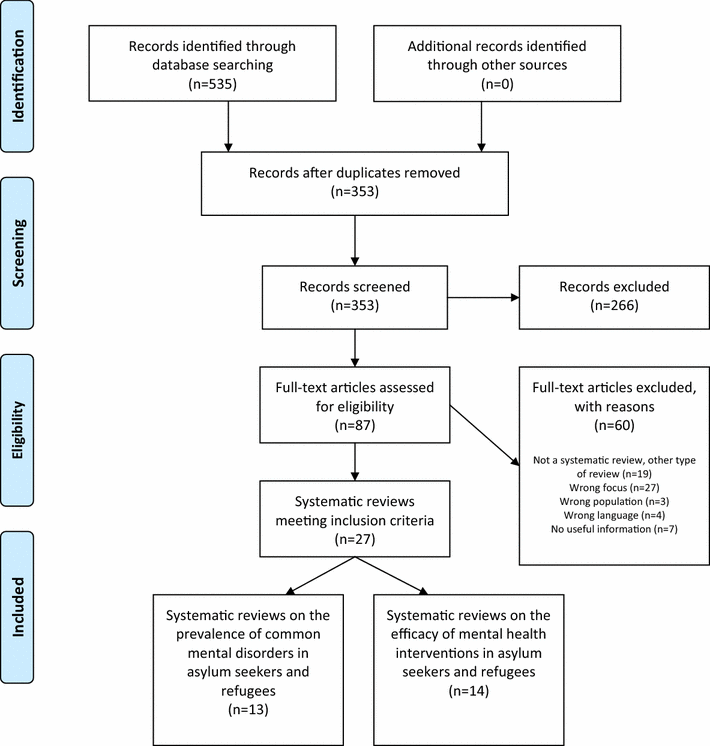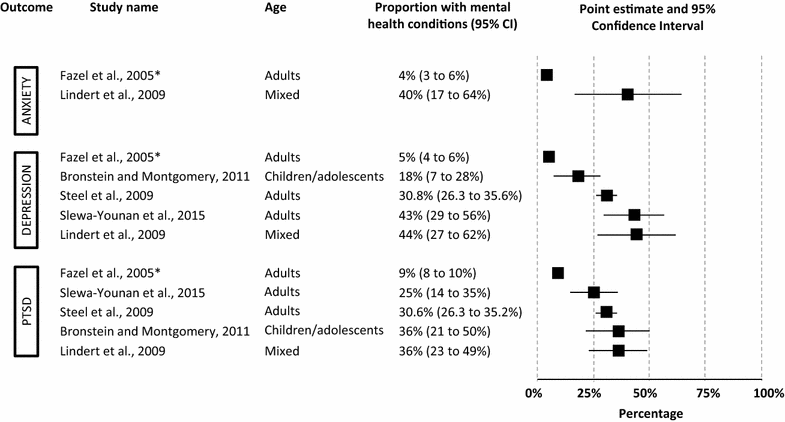Common mental disorders in asylum seekers and refugees: umbrella review of prevalence and intervention studies
- PMID: 28855963
- PMCID: PMC5571637
- DOI: 10.1186/s13033-017-0156-0
Common mental disorders in asylum seekers and refugees: umbrella review of prevalence and intervention studies
Abstract
Background: In recent years there has been a progressive rise in the number of asylum seekers and refugees displaced from their country of origin, with significant social, economic, humanitarian and public health implications. In this population, up-to-date information on the rate and characteristics of mental health conditions, and on interventions that can be implemented once mental disorders have been identified, are needed. This umbrella review aims at systematically reviewing existing evidence on the prevalence of common mental disorders and on the efficacy of psychosocial and pharmacological interventions in adult and children asylum seekers and refugees resettled in low, middle and high income countries.
Methods: We conducted an umbrella review of systematic reviews summarizing data on the prevalence of common mental disorders and on the efficacy of psychosocial and pharmacological interventions in asylum seekers and/or refugees. Methodological quality of the included studies was assessed with the AMSTAR checklist.
Results: Thirteen reviews reported data on the prevalence of common mental disorders while fourteen reviews reported data on the efficacy of psychological or pharmacological interventions. Although there was substantial variability in prevalence rates, we found that depression and anxiety were at least as frequent as post-traumatic stress disorder, accounting for up to 40% of asylum seekers and refugees. In terms of psychosocial interventions, cognitive behavioral interventions, in particular narrative exposure therapy, were the most studied interventions with positive outcomes against inactive but not active comparators.
Conclusions: Current epidemiological data needs to be expanded with more rigorous studies focusing not only on post-traumatic stress disorder but also on depression, anxiety and other mental health conditions. In addition, new studies are urgently needed to assess the efficacy of psychosocial interventions when compared not only with no treatment but also each other. Despite current limitations, existing epidemiological and experimental data should be used to develop specific evidence-based guidelines, possibly by international independent organizations, such as the World Health Organization or the United Nations High Commission for Refugees. Guidelines should be applicable to different organizations of mental health care, including low and middle income countries as well as high income countries.
Keywords: Asylum seeker; Efficacy; Intervention; Mental health; Prevalence; Refugee.
Figures
References
-
- United Nations High Commissioner for Refugees. Regional refugee and migrant response plan for Europe. 2016. http://www.unhcr.org/partners/donors/589497d07/2017-regional-refugee-mig.... Accessed 6 Feb 2017.
-
- Steel Z, Chey T, Silove D, Marnane C, Bryant RA, van Ommeren M. Association of torture and other potentially traumatic events with mental health outcomes among populations exposed to mass conflict and displacement: a systematic review and meta-analysis. JAMA. 2009;302(5):537–549. doi: 10.1001/jama.2009.1132. - DOI - PubMed
-
- McMaster University. Search Filters for MEDLINE in Ovid Syntax and the PubMed translation. http://hiru.mcmaster.ca/hiru/HIRU_Hedges_MEDLINE_Strategies.aspx. Accessed 16 Jan 2017.
LinkOut - more resources
Full Text Sources
Other Literature Sources



